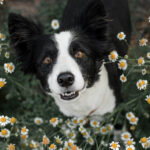Happiness is listening to your dog snore. Or not… Let’s face it, as cute as your pup is, snoring can be irritating, especially in the wee hours of the morning when your dog – who doesn’t have to get up for work – is keeping you – who has to get up – awake.
The question is, why does your dog snore, and can anything be done about it? Should anything be done about it?
Dogs snore for many reasons, and some are just more prone because of their anatomy, which they can’t help. If your dog has never snored before and suddenly starts, it is cause for concern as it could indicate a severe health problem—something you will want to be on top of.
This article will unpack the reasons for dog snoring and if and when you should take your pup in for a vet check.
What is snoring
Snoring is the loud sound of air passing through relaxed tissues in the throat, which vibrate against each other. Just like humans, snoring can be an issue for our furry friends.
Reasons why dogs snore
Here are some of the most common reasons why dogs snore.
Anatomy
Some breeds have flat or short faces, which make snoring almost inevitable, along with breathing complications. Breeds that fit into this category – Pugs, Chow Chows, Shih Tzus, and Chihuahuas – are known as “brachycephalic.”
According to veterinarian Dr. Hohenhaus from NYC’s Animal Medical Center,
“These dogs can often face breathing issues that could prevent them from getting enough oxygen, which is usually corrected with surgery.”
Sleep positioning
Next time your furry friend wakes you up with his snoring, check his sleeping position. Similar to humans, when dogs sleep on their backs, it causes the tissues in the throat to constrict, narrowing the airway. Side sleeping can also cause airways to narrow. To help with this, give your pup a small pillow to rest his head on, which can help to keep the airways open.
Check the scales
One of the side effects of obesity is snoring. Fat collects in the throat and blacks the airway, which causes snoring. Obese dogs may also have difficulty breathing while awake or engaging in physical activities like walking. To combat obesity, feed a nutrient-rich raw diet.
Nasal obstruction
Something as tiny as a blade of grass caught in the nasal passage can trigger a snoring episode. If your dog is a digger, a snout full of dirt can do the same thing. If you notice your pup rubbing its nose on the carpet or reverse sneezing a lot, it is worth a trip to the vet to check things out.
Seasonal allergies
Seasonal allergies are an unfortunate reality for many people, and they can also affect our beloved dogs, causing an increase in mucus production. Signs of allergic reactions in dogs may include itchy skin, ear infections, coughing, sneezing, and snoring. If your pup exhibits these symptoms during allergy season, speaking to your veterinarian about possible treatments is a good idea.
There are some ways you can help reduce seasonal allergy symptoms at home. Regular baths with hypoallergenic shampoo can help remove pollen from their fur, and keeping them away from potential allergens like certain grasses or flowers can also be beneficial.
Bacterial infections
A bacterial infection causes inflamed airways and snoring. If your pup is not a regular snorer and suddenly starts – it may be an indication of infection including.
- Upper respiratory infections. Bordetella bronchiseptica is a common bacteria that cause upper respiratory infections in dogs. Known as kennel cough, this infection results in nasal congestion that can cause dogs to snore. If you suspect your pup has an upper respiratory infection, a trip to the vet is in order.
- Tooth abscess. An abscess on a tooth can cause swelling in the gum tissue, preventing airflow. Tooth abscesses can also cause rhinitis or sinusitis, increasing mucus production that hinders airflow resulting in snoring. Don’t wait to see your vet if you suspect a tooth abscess.
- Bacterial pneumonia: Dogs with pneumonia, a lower respiratory infection caused by bacteria in the lungs, may begin snoring. Additional symptoms include coughing, wheezing, fever, fatigue, and difficulty breathing. Your veterinarian will prescribe antibiotics to help your furry friend recover.
Dirty air
Do you or someone in your home smoke? Secondhand smoke is dangerous not only for humans but also for dogs. Dogs are particularly sensitive to the toxins in secondhand smoke, often suffering from several adverse health effects, such as respiratory problems leading to snoring and skin irritation. In some cases, exposure to secondhand smoke can even lead to cancer or other serious illnesses. If you’re a smoker, it’s best to keep your dog away from any smoke and consider quitting for their health.
Hypothyroidism
Hypothyroidism occurs when the thyroid gland does not make enough of the hormone that controls metabolism. This can decrease muscle tone throughout the body, including the throat muscles that help keep airways open while sleeping. Additionally, hypothyroidism can cause changes in the head and neck that make it harder for a dog to breathe correctly. Other signs of hypothyroidism include a dry and flaky coat, shedding, ear infections, cold intolerance, lack of energy, and weight gain.
Age
Older dogs tend to snore more than younger ones. This is because the muscles around their throat and airways relax as they age, leading to slower airflow during breathing. Additionally, structural changes in their throats can cause them to become narrower and thus lead to more snoring.
How to prevent snoring
Once you rule out anything medically serious going on with your canine companion, you can do a few things to help lessen snoring.
Diet
Because obesity is a precursor to snoring and other serious medical conditions, keeping your dog in top shape is critical. One of the best ways to ensure that your dog stays at a healthy weight is to look at what you are feeding.
Feeding your dog kibble or other low-quality food could be a major contributing factor to obesity. The high carbohydrate content of kibble is the main culprit here; many kibbles contain large amounts of filler grains (like corn, wheat, and soy) that are dense in calories without providing much nutritional value.
Consider switching to a raw diet that will help with weight management and provide optimal energy for your pooch. Because raw diets are made with real food and nutrients that your dog’s body understand, they will experience an overall improvement in well-being.
Too many treats and the wrong kind of treats can also encourage the pounds to stack up. Use treats sparingly and only feed whole food and healthy varieties.
If your pup is food driven and eats super fast, consider a food puzzle. Food puzzles are a great way to slow your pup’s food consumption and relieve tension, boredom, and anxiety.
Exercise
Along with a healthy diet, ensure your dog is getting enough exercise. Dogs are built to be on the move, and regular physical activity helps keep them mentally and physically fit. It can reduce stress and anxiety and help your pup release energy positively (not by chewing up your couch). Regular exercise will help keep your pup’s weight under control and reduce the risk of obesity-related snoring and diseases such as diabetes. Being active with your pet is a great way to bond and spend quality time together.
Air purifiers
Air purifiers help reduce allergens, dust, pet dander, smoke, chemical fumes, and other pollutants that can harm your pup’s respiratory system. Many dogs suffer from allergies or asthma; an air purifier can help filter out the particles that trigger these conditions leading to snoring.
Regular vet checkups
Regular visits to the vet are important for every dog’s health and well-being. It provides a chance for your veterinarian to diagnose any potential issues or illnesses and helps build trust between you, your pet, and the veterinarian.
Additionally, regular checkups allow the veterinarian to perform a thorough physical exam of your dog, checking for changes in weight, body condition score, skin lesions, and other abnormalities. Depending on your pet’s age and lifestyle, the veterinarian may recommend specific diagnostic tests or preventive care.
When to seek immediate help
As you have read, snoring in dogs is common and often not something to be overly concerned about. However, if your dog suddenly starts snoring, is wheezing, has trouble breathing, or otherwise appears unwell, it is wise to consult your vet quickly to rule out anything sinister.






